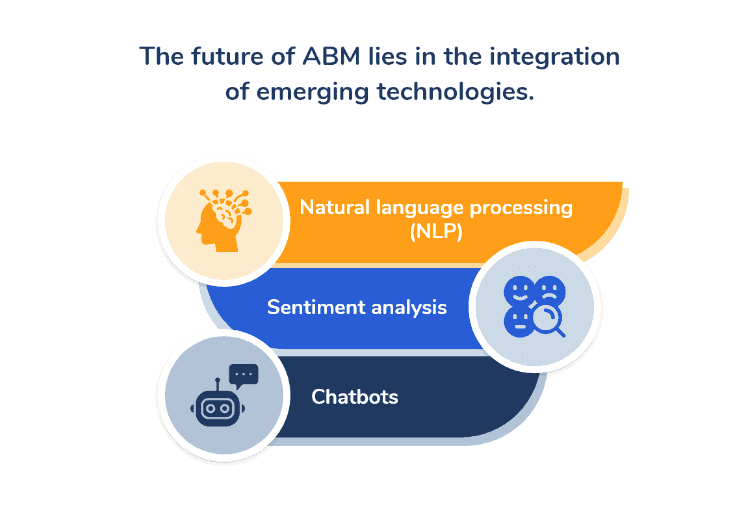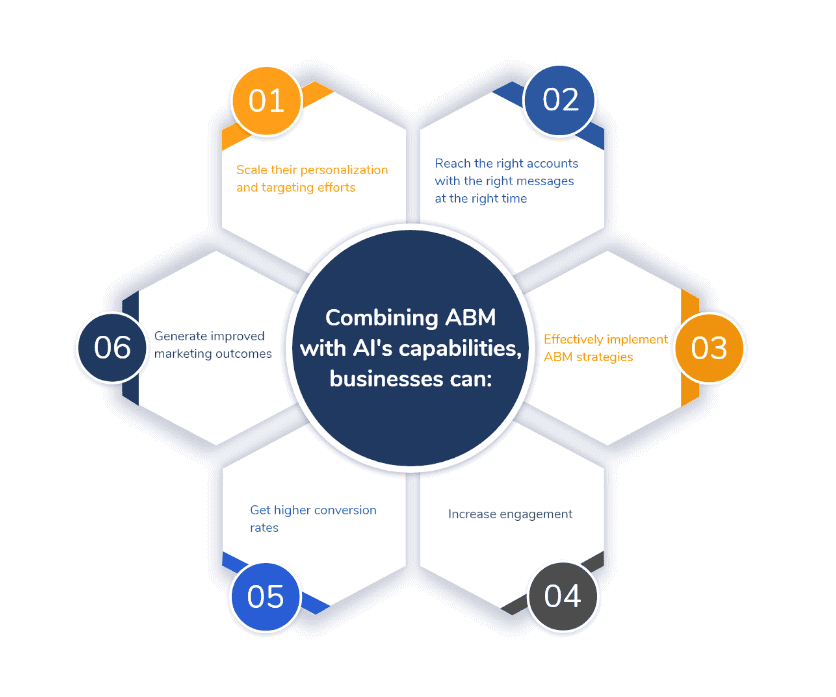
In marketing, businesses always seek effective strategies to connect with their target audience. One approach gaining significant popularity in the B2B is Account-Based Marketing (ABM) with Artificial Intelligence (AI).
ABM is a targeted marketing strategy focusing on individual accounts or companies rather than a broad audience. By tailoring messages and campaigns specifically for key accounts, businesses can increase their chances of engaging with the right decision-makers and closing deals.
According to Forrester, 56% of marketers believe that personalized content is essential for a successful ABM strategy. With this in mind, it is safe to predict that personalization will continue to take center stage in 2023 and beyond.
Earlier in our ultimate guide to account-based marketing, we discussed what ABM envelops and how it works. Now, let’s dive into ABM’s power to drive personalization at scale.
We’ll be covering:
- AI and Machine Learning in Marketing Automation
- Examples of Successful ABM Strategies
- The Role of AI and Machine Learning in ABM
- Implementing AI-Powered ABM
- Challenges and Best Practices
- Future Trends and Predictions
But first, let’s understand,
Importance of Personalization and Targeting in B2B Marketing
Over twenty years ago, Jeff Bezos shared his vision for personalization in an interview, stating,
“[Personalization is when] you go into a bar and sit down, and the bartender puts a whiskey in front of you without having to ask what you want.”
Today, we can see that vision in full play with Amazon.com.
So, personalization and targeting play crucial roles in capturing the attention of potential customers in B2B marketing. Unlike B2C marketing, where a wide audience can be effective, B2B marketing requires a more strategic approach.
Business decision-makers seek solutions that address their pain points and meet their unique needs. By personalizing marketing efforts, businesses can demonstrate their understanding of the challenges faced by their target accounts to establish trust and credibility.
On top of that, with targeted marketing, businesses can prioritize their resources and efforts on high-value accounts. How? Instead of spreading themselves thin across a wide range of prospects, companies can focus on accounts with a higher likelihood of conversion. This targeted approach saves time and resources while increasing the chances of success in securing deals.
Introduction to AI and Machine Learning in Marketing Automation
Artificial Intelligence (AI) and machine learning have revolutionized how marketers approach personalization and targeting.
AI refers to the simulation of human intelligence in machines, enabling them to perform tasks that typically require human intelligence, such as pattern recognition, language processing, and decision-making.
Machine learning is a subset of AI focusing on developing algorithms that allow machines to learn from data and make predictions or decisions.
In marketing automation, AI and machine learning empower businesses to analyze vast amounts of data and extract valuable insights.
If you can leverage these technologies, it will be easier to segment your target audience. Machine learning algorithms can identify patterns in customer behavior and preferences, allowing marketers to tailor their content and offers accordingly.
Examples of Successful ABM Strategies in the B2B Space
Let’s explore some real-life examples of how businesses have successfully implemented ABM strategies using AI and machine learning:
A software provider utilized AI-powered predictive analytics to identify key accounts most likely to convert. They prioritized their outreach efforts by analyzing data from their existing customer base and conducting market research. This targeted approach resulted in higher engagement.
A marketing agency implemented AI chatbots to engage with potential clients and gather information about their needs and challenges. The chatbots utilized natural language processing to understand and respond to inquiries, providing a seamless user experience. Company Z scaled its personalization efforts by automating the initial interaction, ensuring every potential client received tailored recommendations and solutions.
In a nutshell, Account-Based Marketing (ABM) combined with AI and machine learning has proven to be a powerful combination for B2B marketers.
By leveraging AI’s capabilities, businesses can:
- Scale their personalization and targeting efforts
- Reach the right accounts with the right messages at the right time
- Effectively implement ABM strategies
- Increase engagement
- Get higher conversion rates
- Generate improved marketing outcomes
As technology advances, businesses must embrace AI and machine learning to stay ahead in the competitive world of B2B marketing.
The Role of AI and Machine Learning in ABM
Now that you have a better understanding of the significance of ABM in B2B marketing and how it can be amplified through AI and machine learning, it is time to dive deeper into the subject and explore how these technologies can enhance personalization and targeting.
Enhancing Personalization and Targeting in ABM
AI plays a crucial role in enabling personalization and targeting in ABM. By leveraging AI-powered algorithms, businesses can:
- Analyze vast amounts of data
- Identify behavioral patterns and preferences
- Gain insights into individual accounts
This data-driven approach enables marketers to deliver highly personalized and relevant messages, increasing the chances of engagement and conversion.
For example, AI can analyze previous interactions, content consumption, and demographic data to create tailored experiences for each account.
Leveraging Machine Learning Algorithms for Data Analysis
Machine learning algorithms are the backbone of AI in ABM. These algorithms can identify patterns and correlations within large datasets, helping marketers make informed decisions.
By analyzing data on customer behavior, purchase history, and engagement metrics, machine learning algorithms can identify trends and provide valuable insights into the preferences and needs of target accounts.
This information can then be used to customize marketing strategies and create targeted campaigns that resonate with the audience.
Predictive Analytics in ABM: Identifying Ideal Target Accounts
One of the significant benefits of AI in ABM is the ability to leverage predictive analytics. By analyzing historical data and using machine learning algorithms, marketers can identify patterns and characteristics that indicate the likelihood of an account becoming a high-value customer.
This predictive approach allows businesses to focus on accounts with the highest conversion potential, maximizing their return on investment.
Implementing AI-Powered ABM
AI and machine learning have transformed the landscape of ABM, enabling businesses to scale personalization and targeting efforts. Companies can optimize their marketing strategies and connect with key accounts effectively through AI-powered data analysis, predictive analytics, and personalized automation.
Let’s find out more about it in the following lines.
Data Collection and Management for Effective ABM
To successfully implement AI-powered ABM, businesses must prioritize data collection and management. Companies can gain deeper insights into their target accounts by harnessing first-party data—data directly obtained from customer interactions and engagements. This data is the foundation for AI algorithms, enabling more accurate personalization and targeting.
AI-Driven Customer Segmentation and Account Selection
AI assists in customer segmentation and account selection by creating customer personas and ideal customer profiles. By analyzing data from various sources, such as website visits, social media interactions, and previous purchases, machine learning algorithms can identify common characteristics and behaviors among accounts. This information helps marketers define customer segments and select the most relevant accounts to target.
Personalization at Scale with AI
AI enables personalization at scale, even in ABM. By leveraging AI-driven technologies, such as dynamic content creation and customization, businesses can deliver personalized experiences to many target accounts.
For example, AI algorithms can dynamically generate content based on account-specific data, ensuring each message resonates with the recipient. Additionally, AI-powered automated email marketing and personalized campaigns can deliver tailored content and offers based on individual account preferences, boosting engagement and conversion rates.
For example, ChatSpot, an AI-powered chatbot platform, has revolutionized personalized marketing in ABM. ChatSpot’s AI algorithms can understand customer needs and provide real-time recommendations by analyzing customer interactions.
This personalization and instant response level have significantly improved customer engagement and satisfaction, increasing conversion rates for businesses implementing ChatSpot.
Overcoming Challenges and Best Practices
Now that you understand the role of AI and machine learning in ABM, along with successful strategies for implementation, let’s delve into overcoming challenges and best practices for leveraging AI in ABM, as well as future trends and predictions.
Addressing Data Quality and Privacy Concerns
When implementing AI-powered ABM, ensuring data quality and privacy is crucial. It’s essential to have a robust data management system in place that safeguards customer information and complies with relevant regulations.
Regular data cleansing and validation procedures should be implemented to maintain accurate and reliable data. By prioritizing data integrity and privacy, businesses can establish trust with their target accounts and enhance the effectiveness of their ABM efforts.
Ensuring Alignment between Sales and Marketing Teams
Effective collaboration between sales and marketing teams is vital for successful ABM implementation. Both teams must align their strategies, goals, and messaging to provide a cohesive, consistent experience for target accounts.
Regular communication, shared metrics, and joint planning sessions can foster collaboration and improve the overall effectiveness of AI-powered ABM initiatives.
Measuring the Effectiveness of AI-Powered ABM
Measuring the effectiveness of AI-powered ABM is essential for optimizing strategies and demonstrating the value of investments.
Key performance indicators (KPIs) such as engagement rates, conversion rates, and revenue generated from targeted accounts can provide insights into the impact of ABM campaigns.
Additionally, feedback from sales teams regarding lead quality and conversion can help fine-tune AI algorithms and improve targeting accuracy.
Future Trends and Predictions
Emerging Technologies in ABM and AI
The future of ABM lies in the integration of emerging technologies. We can expect the rise of advanced technologies such as:
- Natural language processing (NLP)
- Sentiment analysis
- Chatbots

NLP can help analyze and understand unstructured data, enabling more nuanced personalization.
Sentiment analysis can provide insights into customer emotions and preferences, enabling even deeper personalization.
Powered by AI, Chatbots will continue to evolve and play a crucial role in automating personalized interactions with target accounts.
The Role of AI in Hyper-Personalization for B2B Marketing
AI will enable hyper-personalization in B2B marketing, tailoring messages and experiences to the individual level. With AI-powered algorithms continuously learning from customer interactions and data, businesses can deliver highly customized content and offers based on real-time insights.
Hyper-personalization will enhance customer engagement, build stronger relationships, and drive better business outcomes.
Final Thoughts
As AI advances, marketing managers and executives should embrace its potential in their ABM strategies.
By scaling personalization and targeting through AI-powered automation, businesses can:
- Elevate their marketing efforts
- Drive meaningful engagement
- Achieve higher conversion rates
Overcoming challenges such as data quality and privacy concerns, ensuring alignment between sales and marketing teams, and measuring effectiveness will be crucial for successful implementation.
So, brace yourself to stay ahead of emerging technologies and trends to position your brand for success in the dynamic world of AI-powered ABM.
